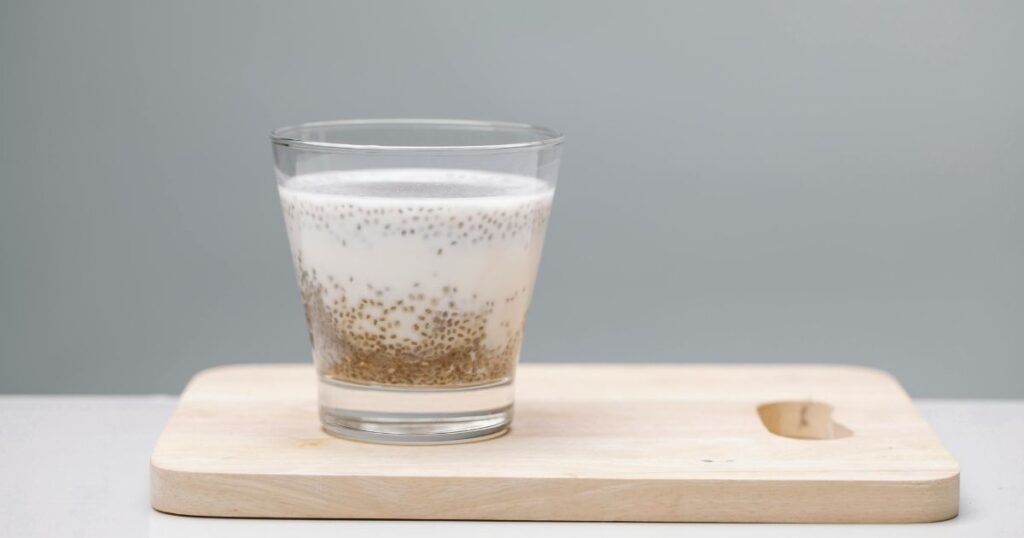Chia seeds, historically a fundamental part of diets among ancient Aztecs and Mayans, have recently gained immense popularity as a health food. These minuscule, nutrient rich seeds have received acclaim for their notable range of health advantages, such as their abundant omega-3 fatty acids, fiber, protein, and vital minerals.
Commonly seen in smoothies, granola bars, and salads, chia seeds are now also being introduced in a new variant, chia seed tea. As a growing number of individuals pursue natural methods for weight loss, a pertinent question emerges, is chia seed tea advantageous for shedding pounds? Numerous health enthusiasts assert that including chia seeds in one’s diet can assist with appetite regulation and fat loss.
Nonetheless, akin to many popular health assertions, it is vital to scrutinize such claims critically and based on scientific validation. Although chia seeds may offer potential health advantages, like promoting digestion, alleviating inflammation, and enhancing cardiovascular health, it’s vital to comprehend their contribution to weight loss through adequate investigation.
Health claims should not be accepted unconditionally, only information grounded in evidence can clarify the effectiveness of chia seeds and specifically chia seed tea in supporting weight loss. This article will examine the existing research, assess the benefits, and provide a well rounded perspective on whether chia seed tea is genuinely an effective instrument for weight loss.

What Are Chia Seeds?
Chia seeds, scientifically referred to as Salvia hispanica, are small black or white seeds indigenous to the arid regions of southern Mexico and Guatemala. They were greatly esteemed by ancient cultures such as the Aztecs and Mayans, who viewed them as a potent source of nourishment. The term “chia” is derived from the Mayan word for strength, highlighting its invigorating characteristics.
Currently, chia seeds are recognized worldwide for their remarkable nutritional benefits and are frequently incorporated into a variety of health foods, ranging from smoothies to baked products. Chia seeds may be diminutive, but they are powerful, delivering an array of essential nutrients in every serving. The seeds consist mostly of fiber, beneficial fats, protein, and a range of key minerals.
A standard 28-gram (one ounce) serving comprises:
Fiber: Chia seeds are an outstanding source of dietary fiber, providing roughly 10 grams per ounce, or 34% of the suggested daily intake. Most of this fiber is soluble, meaning it absorbs water to create a gel like substance, which can aid in slowing digestion and fostering feelings of fullness.
Omega-3 Fatty Acids: These seeds rank among the richest plant derived sources of omega-3s, especially alpha linolenic acid (ALA), which plays a vital role in heart health, brain function, and decreasing inflammation. Chia seeds offer a high quality, plant based protein, with about 4 grams per ounce. This renders them a significant addition to vegetarian and vegan meal plans.
Antioxidants: Loaded with antioxidants, chia seeds assist in counteracting oxidative stress and inflammation within the body. These antioxidants enhance the seeds’ extended shelf life.
Minerals: Chia seeds are abundant in minerals such as calcium, magnesium, phosphorus, and zinc. They provide nearly 18% of the daily suggested intake of calcium, vital for bone health, as well as magnesium, which aids in muscle and nerve function.

How Chia Seed Tea is Made
Making chia seed tea is straightforward and fast, offering a simple method to integrate the advantages of chia seeds into your everyday routine.
Here’s a fundamental recipe for making chia seed tea:
Basic Recipe for Chia Seed Tea:
Ingredients:
- 1 tablespoon of chia seeds, 1 cup of warm water (approximately 200°F or 93°C)
- Optional: lemon, honey, mint, or herbs for added flavor
Instructions: In a glass or cup, place 1 tablespoon of chia seeds. Add warm water (not boiling, as excessive heat may diminish some nutrients). Mix thoroughly and allow the chia seeds to rest for 5–10 minutes. In this period, they will absorb water and swell, creating a gel like texture. Stir once more before consuming to guarantee an even distribution of seeds in the tea. If you wish, incorporate lemon juice, honey, or mint for extra flavor.
The time needed for preparation is minimal, and the chia seeds start to take in the water swiftly, enlarging to form a gelatinous consistency. This procedure boosts the hydration qualities of the tea and renders it more fulfilling, which may aid in weight loss by fostering sensations of fullness.
Variations: You can effortlessly adjust your chia seed tea to match your tastes. Here are several variations to improve flavor and health advantages:
Lemon: Including fresh lemon juice gives a spike of vitamin C and can assist with digestion and detoxifying.
Honey: A natural sweetener that contributes antioxidants and a calming effect to the tea.
Mint: Recognized for its digestive advantages, mint can impart a refreshing flavor while aiding digestion.
Herbs: You can try other herbs like ginger or turmeric for anti-inflammatory effects.

Weight Loss and the Role of Chia Seeds
Chia seeds have received considerable recognition as a natural aid for weight loss, attributed to their abundant fiber content, high levels of omega-3 fatty acids, and their capacity to enhance feelings of satiety. Numerous health advocates and fitness professionals argue that including chia seeds in one’s diet can aid in appetite reduction, enhance hydration, and facilitate fat loss. However, how effective are chia seeds in relation to weight loss, and what does the research evidence indicate?
Appetite Suppression and Satiety:
One of the main ways in which chia seeds may assist with weight loss is their capability to curb appetite. Chia seeds contain a high amount of fiber, especially soluble fiber, that takes in water and enlarges in the stomach, forming a gel like substance. This action aids in slowing down digestion and extending the sensation of fullness. Studies indicate that this gel rich in fiber can postpone gastric emptying, which may diminish hunger and avert overeating.
A research article published in the Journal of Nutrition investigated the impacts of chia seed intake on appetite and food consumption. The findings showed that participants who ingested chia seeds experienced heightened fullness and a decrease in total calorie intake, which could possibly result in weight loss.

Hydration and Metabolism:
Chia seeds’ significant ability to absorb water also makes them an effective means for hydration, a vital element in weight management. Sufficient hydration can mitigate sensations of hunger, as thirst can often be confused with hunger. By maintaining body hydration, chia seeds might indirectly lessen the desire to snack between meals, which could result in fewer calories consumed. In addition, chia seeds provide omega-3 fatty acids, especially alpha-linolenic acid (ALA).
Omega-3s have been associated with a range of metabolic advantages, such as decreasing body fat. They affect fat metabolism by enhancing fat oxidation and facilitating the breakdown of stored fat. Omega-3 fatty acids also contribute to the regulation of gene expression involved in fat metabolism, potentially boosting fat loss when accompanied by a well-balanced diet and exercise routine.
Clinical Research on Chia Seeds and Weight Loss:
Multiple clinical investigations have been carried out to assess the impact of chia seeds on weight reduction, although the findings have varied. A clinical study published in Diabetes Care revealed that supplementation with chia seeds did not result in notable weight loss among overweight individuals, despite the seeds’ capability to enhance blood sugar control and lessen inflammation. Conversely, other research has indicated encouraging outcomes. A randomized clinical trial featured in the Journal of Obesity indicated that participants who incorporated chia seeds into their diet experienced a minor decrease in body weight when compared to those who did not.
The influence of chia seeds on weight loss may rely on different elements, such as the person’s overall dietary habits, level of physical activity, and the amount of chia consumed. Although chia seeds by themselves are improbable to yield significant weight loss, they can certainly contribute to a nutritious, calorie managed diet, especially by aiding in appetite regulation and enhancing hydration.
How Chia Seed Tea Can Impact Weight Loss
Chia seed tea, a straightforward and hydrating beverage created from chia seeds and water, is frequently advertised as a natural support for weight loss. The blend of chia seeds’ abundant nutrient composition, especially their elevated fiber and omega-3 fatty acid levels, renders Chia seed tea is a possible supplement to a calorie restricted diet. Although consuming chia seed tea by itself will not lead to significant weight loss, its distinct characteristics can aid weight management endeavors when paired with a wholesome diet and healthy lifestyle.
Chia Seed Tea as Part of a Calorie-Controlled Diet:
Incorporating chia seed tea into a diet that controls calories may provide various advantages. Given that the seeds are low in calories (approximately 60 calories per tablespoon), consuming chia seed tea can aid in hydration while taking in few calories. This renders it a great option for individuals aiming to lower their calorie consumption without giving up hydration or feeling deprived. The significant fiber content of chia seeds can also assist in regulating blood sugar levels, diminishing spikes and crashes that frequently provoke hunger and cravings for unhealthy foods.
Moreover, chia seed tea can act as a healthier substitute for high calorie drinks such as sugary teas or sodas. By replacing high calorie beverages with chia seed tea, you can decrease your total daily caloric consumption while still relishing a tasty, satisfying drink. When paired with a balanced diet abundant in whole foods like fruits, vegetables, lean proteins, and healthy fats, chia seed tea can boost weight loss efforts by aiding digestion and encouraging fullness.

Possible Drawbacks: Bloating and Digestive Discomfort:
While chia seed tea presents various advantages, it is crucial to take into account possible disadvantages, particularly for those who might face digestive discomfort. Some individuals may encounter bloating, gas, or mild digestive disturbances when ingesting chia seeds, especially if they are unaccustomed to a high fiber diet. This occurs because chia seeds, once hydrated, take in a considerable amount of water and enlarge in the digestive system.
For certain individuals, this might lead to temporary bloating or discomfort as the stomach processes the enlarged seeds. To reduce digestive concerns, it is advised to begin with a minimal quantity of chia seed tea and slowly increase the serving size. Moreover, it is essential to consume plenty of water throughout the day, since the seeds’ capability to absorb liquid can lead to dehydration if adequate water is not ingested with them. Individuals with existing digestive issues, such as irritable bowel syndrome (IBS), may also consider consulting a healthcare professional before adding chia seed tea to their regimen.
What the Research Says: Scientific Studies on Chia Seeds and Weight Loss
Chia seeds have been promoted as a possible aid for weight loss, with supporters claiming that they can assist in appetite control, enhance digestion, and aid in fat reduction. Although numerous people assert that they notice advantages from adding chia seeds to their diets, scientific investigation into the connection between chia seeds and weight loss has produced inconsistent outcomes. Multiple studies have been carried out to examine the impact of chia seeds on weight management, with differing results concerning their effectiveness.
Supporting Studies:
Several clinical trials indicate that chia seeds may have a slight impact on weight loss, mainly due to their high fiber content, which aids in enhancing feelings of fullness and lowering total calorie consumption. A study published in the Journal of Nutrition in 2009 examined the influence of chia seeds on appetite and food consumption. The researchers discovered that participants who ingested chia seeds experienced increased feelings of fullness and ingested fewer calories during the study duration.
The abundant fiber content of chia seeds is believed to absorb water and create a gel like texture in the stomach, aiding in slowing digestion and extending satiety. Another investigation published in Diabetes Care in 2009 analyzed the effects of chia seeds on individuals who are overweight and diabetic. The findings revealed that chia seed supplementation did not significantly decrease body weight, but it did assist in enhancing blood sugar regulation and decreasing inflammation. While weight loss was not a key outcome of the study, the results imply that chia seeds may provide other health advantages, such as improved metabolic function, which could indirectly aid weight management.
In a similar manner, a randomized clinical trial published in Obesity in 2016 discovered that chia seed supplementation had a minor but beneficial effect on weight reduction in obese women. The study participants who included chia seeds in a calorie-controlled diet experienced a slight decrease in body weight compared to those who did not include chia seeds. Nevertheless, the outcomes were not substantial, emphasizing that chia seeds alone are improbable to result in significant weight loss without additional lifestyle modifications.

Studies That Found Limited Effectiveness:
Despite some hopeful findings, other research has observed minimal to no effect of chia seeds on weight reduction. A 2012 study published in the European Journal of Clinical Nutrition investigated the impact of chia seeds on overweight individuals and observed no significant alterations in body weight, body fat, or waist circumference following chia seed supplementation. In the same vein, a 2015 review of various clinical trials determined that although chia seeds are a nutrient rich food, there is inadequate evidence to validate that they have a meaningful effect on weight loss.
A meta analysis published in 2018 assessed multiple studies concerning chia seeds and weight loss and discovered that while chia seeds might aid in slight weight reductions, these outcomes were minimal and improbable to be a “magic bullet” for weight loss. This review pointed out that even though chia seeds are abundant in fiber and beneficial fats, their contribution to weight management may be more indirect, facilitating a well-rounded diet instead of serving as a primary weight-loss strategy.
Limitations and Need for Further Research:
The mixed outcomes from these studies emphasize several important limitations in the current body of research. A significant number of the clinical trials involve small sample sizes or brief durations, which complicates the ability to reach definitive conclusions. Furthermore, most studies have examined chia seeds as part of a larger dietary context, without isolating their specific impact on weight loss. This complicates efforts to ascertain whether chia seeds genuinely contribute to weight loss, or if their advantages stem from the broader dietary and lifestyle modifications they are typically associated with.
There is also an absence of long-term studies regarding chia seeds and weight loss. While short term studies have indicated some advantages, additional research is required to ascertain whether the impact of chia seeds on weight loss is maintainable over an extended period. Larger, rigorously controlled trials that concentrate on the mechanisms through which chia seeds may influence weight loss, such as appetite regulation, fat metabolism, and hydration, are crucial for a comprehensive understanding of their potential function in weight management.
Conclusion
Chia seed tea presents various potential advantages for weight management, mainly through its capacity to enhance sensations of fullness and promote hydration. The substantial fiber content of chia seeds aids in slowing down digestion and extending feelings of fullness, which may help in lowering overall calorie consumption. Furthermore, the omega-3 fatty acids and antioxidants found in chia seeds contribute to metabolic wellness and fat metabolism.
Nonetheless, although chia seed tea can serve as a beneficial component in a weight loss plan, it is improbable to result in significant weight loss independently. A comprehensive approach incorporating nutritious eating, consistent exercise, and lifestyle modifications continues to be the most effective method for attaining and sustaining weight loss. As with any dietary adjustment, it is crucial to seek advice from a healthcare professional prior to introducing chia seed tea or any other supplement into your regimen to confirm its suitability for your personal health requirements.
Frequently Asked Questions (FAQs)
1. What are chia seeds?
Chia seeds are tiny black or white seeds obtained from the Salvia hispanica plant, which is indigenous to southern Mexico and Guatemala. They are rich in nutrients like fiber, omega-3 fatty acids, protein, and vital minerals such as calcium and magnesium. In the past, they were a fundamental food source for the Aztecs and Mayans.
2. Can chia seed tea help with weight loss?
Chia seed tea might aid in weight management mainly because of its elevated fiber content, which encourages a sense of fullness and aids in appetite regulation. It additionally supports hydration and can substitute for high calorie drinks, thereby decreasing total calorie consumption. Nevertheless, it isn’t a miraculous fix for losing weight, incorporating it into a balanced diet and healthy way of living is essential.
3. What role do chia seeds play in appetite control?
Chia seeds contain a significant amount of soluble fiber, which takes in water and creates a gel like substance in the stomach. This aids in slowing down digestion and extends the sensation of fullness. Research has indicated that chia seeds can diminish appetite and assist with portion management, resulting in a reduction of total calorie intake.
4. What are the potential health benefits of chia seed tea?
Chia seed tea is abundant in omega-3 fatty acids, antioxidants, and minerals that promote heart health, aid digestion, and reduce inflammation. Its elevated fiber content supports digestive health and enhances hydration, making it an excellent option for sustaining overall wellness.
5. Can chia seed tea replace other beverages?
Yes, chia seed tea can serve as an excellent substitute for sugary beverages such as sodas or sweetened teas. By swapping out high-calorie drinks for chia seed tea, you can decrease your daily calorie consumption while continuing to relish a tasty and hydrating drink.
6. Are there any side effects of drinking chia seed tea?
Some people might encounter bloating or digestive unease because of the elevated fiber level in chia seeds, particularly if they are not accustomed to a diet rich in fiber. To prevent digestive problems, it is recommended to begin with a minor portion and incrementally raise the quantity. Additionally, consume ample water during the day to aid in hydration.
7. What does research say about chia seeds and weight loss?
The studies regarding chia seeds and weight reduction are varied. Certain research indicates that chia seeds could modestly assist in weight loss by enhancing feelings of fullness and decreasing calorie consumption. Conversely, other studies have reported minimal to no impact on body weight. Chia seeds probably will not result in substantial weight loss without further lifestyle modifications, including a nutritious diet and consistent physical activity.
8. How much chia seed tea should I drink for weight loss?
There is no established suggested quantity for losing weight, but drinking a cup of chia seed tea daily, when included in a calorie controlled diet, can assist with hydration and controlling appetite. However, it ought to be a component of a more extensive weight management strategy that consists of nutritious eating and consistent physical activity.
9. Can chia seed tea replace a meal?
Chia seed tea is a low-calorie drink and ought not to be used as a meal substitute. Although it may assist with hydration and curb hunger, it does not provide the essential nutrients needed to completely replace a meal. It’s most beneficial to consume chia seed tea in conjunction with a balanced diet.
10. Should I consult a doctor before drinking chia seed tea?
If you experience digestive problems or other health issues, it’s advisable to speak with a healthcare provider prior to incorporating chia seed tea or any supplement into your diet. This will guarantee that it’s an appropriate option considering your specific health requirements.

